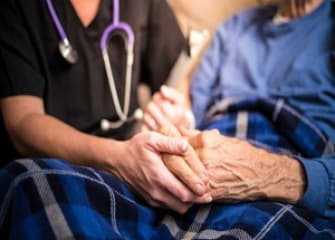
As COVID-19 wreaked havoc in Maryland last spring, area hospice providers were forced to rethink their entire approach to delivering care; many faced exorbitantly higher operating costs.
Hospice work is inherently intimate and typically a face-to-face practice. Hospice practitioners — nurses, social workers, chaplains, aides, and other clinicians — help critically and terminally ill people come to terms with their deaths and help their families prepare for life after.Hospice patients are at arguably the most vulnerable points in their lives, and hospice workers must build strong, trusting relationships with them. This is no easy feat under the best of circumstances, but the risks associated with the COVID-19 pandemic make it exceedingly difficult.
Mike Brady, president and chief executive officer of Hospice of the Chesapeake, which serves Anne Arundel, Charles and Prince George’s counties, says many of the organization’s practices had to be adjusted abruptly last spring.
READ FULL ARTICLE HERE


































